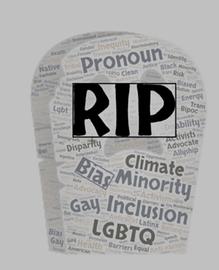The English language, some 1,500 years old, died this month. English had shaped civilizations and connected cultures for centuries, and leaves behind a rich legacy of literature, art, and communication. Though it had held on bravely through the overwhelming onslaught of the Internet, recent demands by President Donald Trump placed too much of a strain on the diminished language.
 Despite the Trump administration's executive order declaring that the United States' official language is English, its actual use was maimed by other orders banning the use of hundreds of words and terms in official documents, government websites, and eventually common use.
Despite the Trump administration's executive order declaring that the United States' official language is English, its actual use was maimed by other orders banning the use of hundreds of words and terms in official documents, government websites, and eventually common use.
Though the New York Times reported that "only" about 250 words were removed from the Trump administration's lexicon, the list included words vital to the language and to communication: diverse, they/them, antiracist, privilege, black, women, trauma, sex, disability, and many others. Even official historical artifacts, such as pictures of the World War II bomber Enola Gay, fell afoul of the administration's policies. The language was also hamstrung by the administration's insistence, soon after taking power, on renaming familiar locations, like the Gulf of Mexico and Mount Denali, and rebranding well-known airports and institutions with Trump's own name (and let's not even mention that font).
Many have offered tributes to the English language, among them:
"The English language is nobody's special property. It is the property of the imagination: it is the property of the language itself," said Sir Derek Walcott, poet, playwright, and recipient of the Nobel Prize in Literature.
Former Arkansas governor Asa Hutchinson said, "I believe it is our values and our ideals that ultimately bind us together as a nation. But it is the English language which serves as the means by which we can communicate these values to those around us."
Author Rita Mae Brown noted, "Language is the road map of a culture. It tells you where its people come from and where they are going."
Journalist Oliver Darcy wrote: "When the battle is over what words are permitted to be used, cute linguistic gymnastics amount to a surrender. Words are the front lines of truth...."
Canadian-born author and commentator David Brooks summed it up: "There is the English language and then there's the Trump language."
Though variants of English remain in use in countries like Canada, that's subject to change. In lieu of flowers, we encourage you to buy a book from an independent bookstore. While you can still find one.

